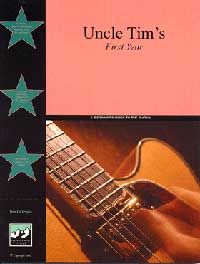

If You Are Going To Play In A Key Every Day, Shouldn't You Learn That Way?
Yes, you should!
Music is key based. You are always in one key or another. Always!
Yet playing a guitar is not taught that way! Why?
Once you understand keys and the chords and scales that come from keys, the whole world of music opens up before your eyes!
Suddenly everything is MUCH easier. And it totally makes sense when you get into it.
For $15, you can put this all to rest right now. Pick up a copy today.
eBooks are delivered instantly!
By Tim Gillespie
Lately I have had a chance to talk to some friends of mine that bought copies of Uncle Tim's First Year and are now reporting back on how it has changed their perspective. That, I am happy to say, is not unusual. But what is more cool is how it has changed the way they regard scales and how it has infected their music. If nothing else it has taken much of the mystery on how to proceed, out of the equation.
I love this.
When I wrote Uncle Tim's First Year, scales were not the most well regarded technique to improve a person's playing. The stigma attached to scales is hard to overcome. They are not popular at all. But that doesn't change anything. They work. They work fast too.
Of all the tools available to a guitar player to help them improve, nothing works like scales. And to hear a bunch of people come back and tell me they enjoy the time spent and notice how it improves their abilities, I feel like I have done my job.
If you don't play scales, you most likely have some blind spots. There are some abilities that only get developed if you play scales. Your ear benefits greatly from hearing the string of notes in a key and your brain starts to link some concepts together too. I am not sure how scales got such a bad name but it is something we have to work through.
A neighbor of mine has started to play the guitar again and this time he is putting in a healthy dose of scale work to augment his redevelopment. I told him to start out each day by playing them, just as I suggest for everyone.
At times he can't wait to report back on his progress. He tells me about his ever increasing length of time spent practicing every day. At first he was only going to play scales for 10 - 15 minutes every day. Now his overall practice time has ratcheted up to between two and four hours a day and scales are filling up a minimum of one hour. In all the years he has been playing, he has never gone through a growth period like he is now.
Scales have energized his hands and muscles and his awareness of music has taken off. Its all he talks about these days. They have infected his playing.
What he does not know yet is what we are going to do with them. He keeps asking me to jam with him and I keep telling him to keep practicing. I have a plan.
Right now he is quite happy playing scales and experiencing the fast growth they are responsible for. But what he does not know yet is what will happen once he starts to jam with progressions and lead lines. I am delaying that experience until his hands are more developed and the feel of playing linear lines of music becomes more ingrained. There is some risk in doing so, but I am watching the situation carefully. Once he hits a certain level and we then introduce jamming, he is going to get another big increase in the level of fun the guitar brings him. I expect his playing to increase again after he experiences this.
I consider improvisation one of the most expressive form of music available. Improvisation does not have to be complicated. In fact some of the nicest results can be obtained by stringing together simple progressions and creating leads out of the open string scales. It helps to be able to play some closed string scales too. It provides a sense of freedom of travel, and contributes to the feeling a guitarist is growing and learning to use more tools.
One of the attractions to playing guitar is learning new things and applying them. It seems to keep lots of people coming back.
I know that once my friend experiences the joy of improvising music, his desire to play the guitar will escalate. Improvising is pure application and fun. Theoretical concepts are nice but applying them and getting results is electrifying. It really makes you feel like you are in control and taking charge. It is also a very good way to learn how to harness the tools available and make them work for you.
There are many different things a person can do with a guitar. I see new applications all the time. I encourage people to go out and experiment and then report back. Even after hundreds of years of human beings playing guitars and lutes, there is still much to be created that has not existed before. There is much room for creativity.
But with all the different directions a person can take their music, there are some commonalties we should all share. Scales is one of these commonalties.
Everyone should play scales! Everyone!